Introduction
In the ever-evolving world of e-commerce, choosing the right platform for your online store can be a game-changer. Shopify, launched in 2006, has been a front-runner in this space, offering a comprehensive suite of tools for businesses of all sizes to sell their goods online. But with changing business needs, growing competition, and evolving customer demands, it’s understandable why many online retailers are now exploring the best Shopify alternatives.
With over a million businesses across 175 countries, Shopify has undoubtedly made a significant impact on the e-commerce landscape. Its user-friendly interface, built-in marketing tools, and wide range of design templates have earned it a solid reputation. However, as businesses grow and evolve, they often find themselves in search of more flexible, cost-effective, or specialized solutions. This is where Shopify alternatives come into play.
Shopify alternatives offer a range of different features, pricing models, and selling capabilities that might better align with your business objectives. These alternatives, while carrying their unique strengths and features, can potentially provide the necessary customization, cost efficiencies, or targeted tools that Shopify may lack for certain businesses.
Therefore, understanding Shopify alternatives is not just about seeking out a different platform – it’s about finding a solution that best matches the specific needs and goals of your business. These alternatives can be particularly crucial for enterprises aiming to boost their store performance and profitability in 2023.
With the right choice among Shopify alternatives, your e-commerce business can continue to grow, compete effectively, and deliver an exceptional customer experience in the ever-dynamic online retail space.

Table of Contents
Understanding Shopify
The Rise of Shopify
Shopify has significantly gained momentum since its inception, making it one of the most popular eCommerce platforms globally. It offers user-friendly, feature-rich, and scalable solutions for both small and large enterprises. The platform’s rise can be attributed to its ease of use, comprehensive functionality, reliability, and diverse selection of sleek templates.
Its user-friendly interface makes it the go-to choice for entrepreneurs with basic tech skills who cannot hire a web developer. The performance and reliability of the platform are coupled with no-stress uptime and speed. Furthermore, Shopify has a wide range of certified partners that provide support to its users, making it a viable option for beginners.
However, despite its robust offerings, various Shopify alternatives on the market may offer better-suited solutions for specific businesses based on their unique needs and budgets.
Features of Shopify
Shopify stands out as a comprehensive, plug-and-play eCommerce solution. Its features cater to all the technical details that go into running an online store, including hosting, domain name, maintenance, software updates, and more. One of Shopify’s major attractions is its design feature. It offers a broad variety of good-looking themes, which contributes to its popularity among business owners.
The platform also features an extensive app store, where users can access a wealth of applications to enhance their store’s functionality. In addition, Shopify is well-known for its seamless integration with various dropshipping solutions, such as Ordoro. This integration eases the process of running a dropshipping business for many online store owners.
Shopify’s built-in marketing and discount tools offer users added advantages, allowing them to effectively promote their products and attract more customers.
When considering the cost, Shopify’s pricing plans are designed to offer value. They provide an array of options tailored to meet different business needs and financial capabilities. However, it’s worth noting that the platform charges transaction fees, and its basic plan starts at $29/month, which may be considered expensive by some business owners. For this reason, it’s essential to consider Shopify alternatives that might offer cheaper and potentially better solutions.
Shopify alternatives like WooCommerce, Magento, BigCommerce, and many more offer unique advantages such as greater customization options, lower pricing, and more robust functionalities in specific areas. When choosing an eCommerce platform, it’s crucial to consider these alternatives and pick the one that aligns best with your business model and goals.

5 Reasons to Consider Shopify Alternatives
Let’s delve into the reasons why you might consider Shopify alternatives for your e-commerce venture.
- Pricing and Additional Fees
The first reason to consider Shopify alternatives is their cost. While Shopify offers various pricing plans, these can add up, especially for small businesses or startups with a tight budget. Some platforms may have lower monthly fees or even offer free plans.
Moreover, Shopify’s costs are not just limited to monthly subscriptions. They also include additional fees such as transaction fees, which could make the overall pricing relatively high. This is where Shopify alternatives might offer a more cost-effective solution.
- Hosting Options
Another aspect to take into account is hosting. Shopify includes hosting in its monthly fee, whereas other platforms, such as Ecwid and WooCommerce, allow you to choose your own hosting service.
This could provide you more control over your site’s hosting, and if you already have a hosting service, considering Shopify alternatives can save you some expenses.
- Customization and Control
Some users find Shopify’s platform somewhat rigid when it comes to customization. While it’s excellent for selling products, it’s not a content management system like some of its competitors. This lack of customization and control can be a disadvantage for some users who want to tailor their e-commerce store in unique ways. Shopify alternatives like WooCommerce and Magento offer more customization options and control over the look and feel of your site.
- Dependency on Third-Party Apps
Although Shopify provides an extensive app store, many necessary features for an online store might require third-party applications. These additional apps not only add complexity to your store setup but also often bring extra costs. This could drive users to seek Shopify alternatives that offer more inbuilt features, reducing dependency on third-party apps.
- Scalability and Adaptability
As your online business grows, so should your e-commerce platform. Some users find that Shopify might not be the most adaptable or scalable solution as their business evolves.
Shopify alternatives like WooCommerce are open-source, fully customizable, and offer the freedom of migration and full scalability. These platforms can grow and adapt with your business needs, which makes them worth considering.
Overall, while Shopify is indeed a popular and reliable ecommerce platform, these reasons highlight why some users might opt for Shopify alternatives. Whether it’s the cost, customization options, or scalability, considering Shopify alternatives can offer benefits tailored to your specific needs and growth plan.
Deciding on Your Next Ecommerce Platform: Features to Consider
If you are considering transitioning from Shopify or simply weighing your options amongst the myriad of Shopify alternatives, this article is intended to guide you through your decision-making process.
As your business evolves, your needs may outgrow the capabilities of your existing platform, leading you to seek more robust, customizable, and flexible solutions.
Selecting an ecommerce platform can seem daunting, but breaking down the process into the following key features will help streamline your considerations.
Pricing and Fees: One of the most prominent factors to consider is the cost. Different platforms have different pricing structures, including monthly subscriptions, transaction fees, and payment gateway charges. Depending on the platform, these costs can quickly accumulate, especially for small businesses.
Hosting: Consider whether you prefer a hosted or self-hosted solution. Shopify alternatives like Wix and BigCommerce provide hosting as part of their monthly fees, while others like WooCommerce or Ecwid require you to set up your store on a separate hosting platform.
Customization and Flexibility: The ability to customize your online store is crucial for creating a unique brand identity. Some platforms offer limited templates and customization options, which can limit your creative freedom.
Scalability: Shopify’s main advantage over some alternatives is its scalability. As your business grows, your platform must be able to adapt and handle an increase in traffic and transactions.
Ease of Use: A user-friendly interface is important, especially for businesses without a technical background. Shopify is known for its straightforward interface, but several Shopify alternatives offer similar ease of use.
Features and Functionality: Your business may require specific features, such as product categorization, inventory management, SEO tools, or integrated marketing functionalities. Consider these needs when exploring alternatives.
Security: Ecommerce platforms should be secure for clients to trust your business. Shopify is certified Level 1 PCI DSS compliant, which means it provides a secure shopping experience for users. It’s important to ensure that any Shopify alternatives you consider offer similar security features.
Support: Good customer support can make the difference in the successful operation of your online store. It’s important to ensure the platform you choose offers comprehensive customer support.
Various Shopify alternatives offer differing combinations of these features, so the choice largely depends on your specific business needs and goals.
Popular Shopify alternatives that could be considered include BigCommerce, WooCommerce, Wix, Magento, Squarespace, and others. Evaluating the offerings of these platforms against your business needs should help you make an informed decision.
Top 15 Shopify Alternatives in 2023
In this section, we will explore two of the top Shopify alternatives that offer a unique blend of features, benefits, and potential disadvantages that can cater to various business needs
WooCommerce
WooCommerce is a prominent eCommerce platform, and one of the strong Shopify alternatives, primarily known for its open-source nature and the fact that it’s built on top of WordPress.
This integration with WordPress gives it a comprehensive Content Management System (CMS) that can be beneficial for eCommerce stores wanting to maintain a robust blog section.
Features of WooCommerce
- Customizability: Being open-source, WooCommerce is fully customizable, giving users the ability to tweak and modify their stores as they see fit.
- Scalability: WooCommerce offers full scalability, growing and adjusting according to the demands of your store.
- WordPress Integration: As a WordPress plug-in, WooCommerce can easily fit into any WordPress website, offering eCommerce capabilities.
Pros
- Offers freedom of migration.
- Can handle product categorization and updating inventory stock.
- Great CMS due to WordPress integration, ideal for eCommerce stores that also want a blog.
Cons
- As a self-hosted solution, users need to manage hosting, which can be challenging for some.
- It might feel “stitched together” and clunky to some users due to its plug-in nature.
Pricing
Pricing for WooCommerce varies as the core software is free, but additional costs can include hosting, premium themes, and extensions.

Sellfy
Sellfy is another of the Shopify alternatives that cater mainly to content creators and makers. This platform is designed for simplicity, allowing users to sell physical products, digital products, and Print on Demand (POD) merchandise.
Features of Sellfy
- Product Variety: Sellfy lets you sell a broad range of items, including physical and digital products, and POD merchandise.
- User-Friendly: Sellfy has a reputation for being simple and straightforward, making it ideal for beginners.
Pros
- Ideal for content creators and makers who desire a simple eCommerce solution.
- Allows the selling of a variety of product types.
Cons
- Might not be as robust or feature-rich as other eCommerce platforms.
- Might not be suitable for larger businesses needing more extensive features.
Pricing
Sellfy’s pricing structure is straightforward with three plans:
Starter ($19/month) Business ($49/month) Premium ($99/month).
Each offers more features and fewer limitations as the price increases.
Remember, while Shopify has been a leader in the eCommerce industry, these Shopify alternatives can offer unique features and benefits that may better align with your specific needs. Always consider your business requirements and budget before deciding on a platform.
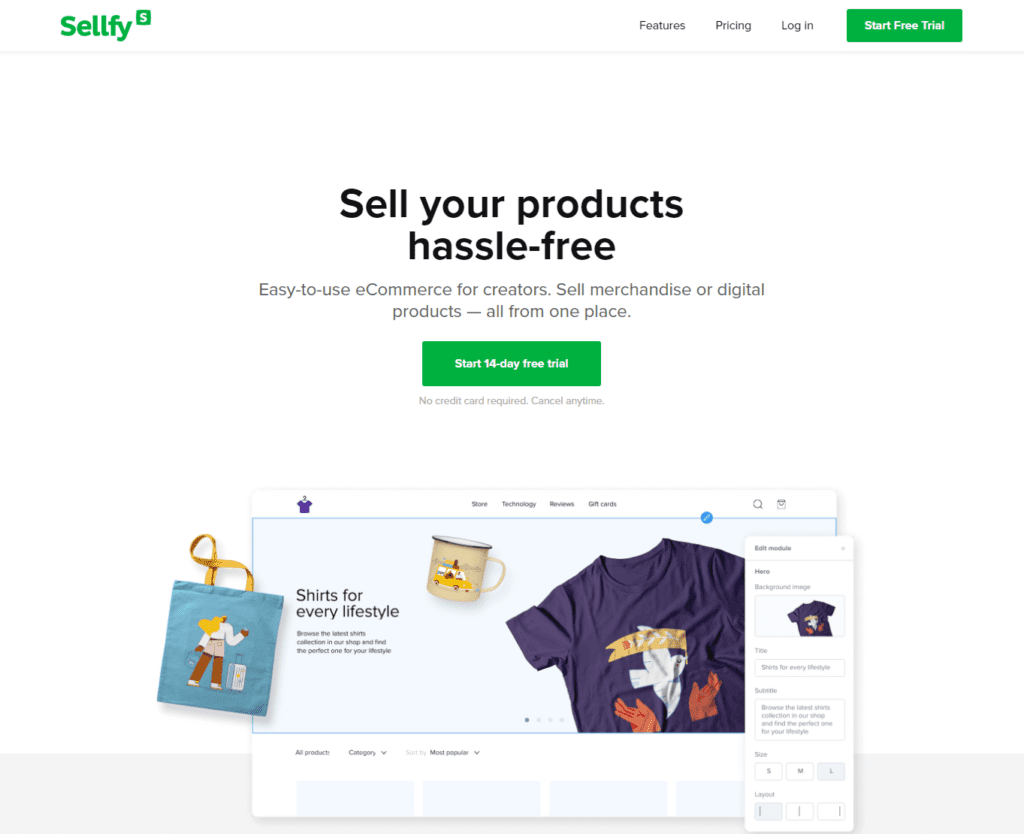
PrestaShop
PrestaShop is a popular open-source ecommerce platform, often considered one of the solid Shopify alternatives. You can download and start using it completely free of charge.
Features
- Extensive customization: As an open-source platform, it provides direct access to the underlying code, offering the flexibility to modify and extend the script to create a tailored online store.
- Multi-currency support: This feature makes it easy to sell worldwide.
- Integrated checkout: Provides a seamless checkout experience for customers.
- App store: Allows access to numerous apps to enhance store capabilities.
Pros
- It is 100% free and does not take a percentage of your sales.
- PrestaShop has a global community of enthusiasts ready to provide help, making it a great source for problem-solving and networking.
Cons
- It does not offer native SEO features, mobile-friendly support, or email marketing tools, making it slightly behind in today’s digitally dominated market.
- Lacks 24/7 support, which might pose difficulties for those new to ecommerce.
Pricing
PrestaShop is free to use, but there could be additional costs related to website hosting, security, and extensions.

Magento
Magento is another strong contender in the Shopify alternatives lineup, catering primarily to mid to large-size businesses. Magento stands out for its vast customization capabilities and feature-rich offerings.
Features
- SEO features: Magento offers native SEO features to boost your store’s visibility in search engine results.
- Mobile-friendly: The platform ensures your store is optimized for mobile use, an essential feature in today’s mobile-first world.
- Multi-currency support: Allows businesses to sell worldwide.
- App Store: Access to numerous apps for enhancing store functionality.
- Integrated Checkout: Provides a seamless checkout experience to customers.
Pros
- Magento offers a great deal of flexibility and control with its open-source nature.
- It allows for extensive customization, offering unique ways to build an e-commerce store to match your specific needs.
Cons
- Magento does not offer 24/7 support, which may prove difficult for businesses without an in-house IT team.
- The complexity and sophistication of Magento may not be ideal for those new to ecommerce.
Pricing Plans
Magento offers a free version known as Magento Open Source. However, they also offer a paid version known as Magento Commerce, which comes with advanced features and support. The Magento hosting price depends on the performance and functionality required for your eCommerce website, averaging between $10–50/month.
It’s important to consider these Shopify alternatives carefully, based on your specific needs and technical capabilities, to make the most of your ecommerce journey. Both PrestaShop and Magento offer unique features and advantages that can aid businesses in developing a comprehensive online presence.
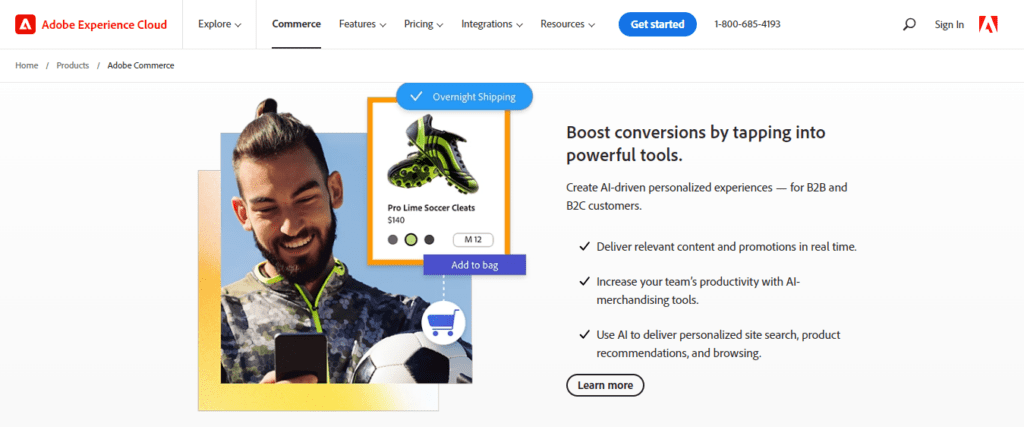
Ecwid
Ecwid is an exceptional ecommerce platform and one of the valuable Shopify alternatives. As a platform, it shines with its diverse features and notable benefits.
Key Features
- Highly customizable with a wide range of themes
- Offers a free plan for small businesses
- Embeds into any web presence (websites, social media, etc.)
- Responsive shopping cart which works seamlessly on mobile devices
- Extensive third-party app integrations.
Pros
- The free version is highly competitive, making it a cost-effective Shopify alternative for small businesses.
- The software embeds into any existing online presence seamlessly.
- Ecwid offers multiple sales channels, including social media platforms and marketplaces.
- It’s straightforward to use with a user-friendly interface.
Cons
- Though it’s scalable, large businesses might find it less comprehensive than Shopify or similar platforms.
- Customization options may be limited in comparison to other platforms.
Pricing
Ecwid offers a free plan with basic features. Its paid plans start from $14.08 per month and go up to $99 per month for the Unlimited plan, which includes all features
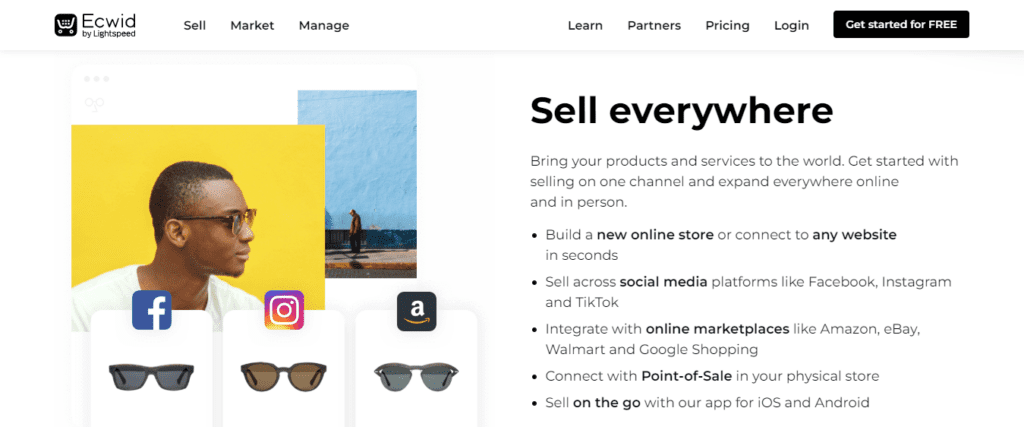
Weebly
Weebly is a renowned ecommerce and website building platform that competes well with Shopify alternatives. It’s known for its simple yet powerful website building tools and ecommerce features.
Key Features
- Intuitive website builder with drag-and-drop functionality
- Integrated shopping cart and secure checkout
- Inventory management and tracking
- SEO tools and guides
- Customizable templates and themes
Pros
- Weebly is user-friendly, especially for beginners, as it requires no coding knowledge.
- Its pricing plans are more affordable than many Shopify alternatives.
- The platform offers an impressive range of customizable templates.
- SEO features are integrated, aiding in better website visibility.
Cons
- Its ecommerce functionality may be less advanced than dedicated ecommerce platforms like Shopify.
- Third-party app integration is limited compared to other platforms.
Pricing
Weebly offers a free plan for basic use. Paid plans start from $10 per month (when paid annually) for personal use and go up to $26 per month for the performance plan tailored for online stores.

OpenCart
OpenCart is an open-source ecommerce platform and serves as an attractive option amongst the various Shopify alternatives. With robust features and extensive customization, it provides a satisfying user experience.
Key Features
- Open-source and fully customizable
- Offers multi-store function
- Comes with built-in SEO features
- Supports unlimited products and categories
Pros
- Being open-source, OpenCart allows full customization of the online store, which can be a significant advantage over many Shopify alternatives.
- It supports an extensive array of payment gateways and shipping methods.
- The platform is ideal for multi-lingual and multi-currency stores.
- OpenCart has a large and active community, ensuring good support.
Cons
- The platform may require a degree of technical knowledge to customize and manage effectively.
- OpenCart may require additional plugins for certain advanced features, potentially increasing costs.
Pricing
OpenCart is a free, open-source platform. However, costs can arise from web hosting, security measures, and if premium extensions or professional development assistance are required.
As we discuss Shopify alternatives, we can say that Ecwid, Weebly, and OpenCart each bring unique advantages to the table. Whether you value affordability, user experience, or customization, these platforms can cater to your business’s specific ecommerce needs.
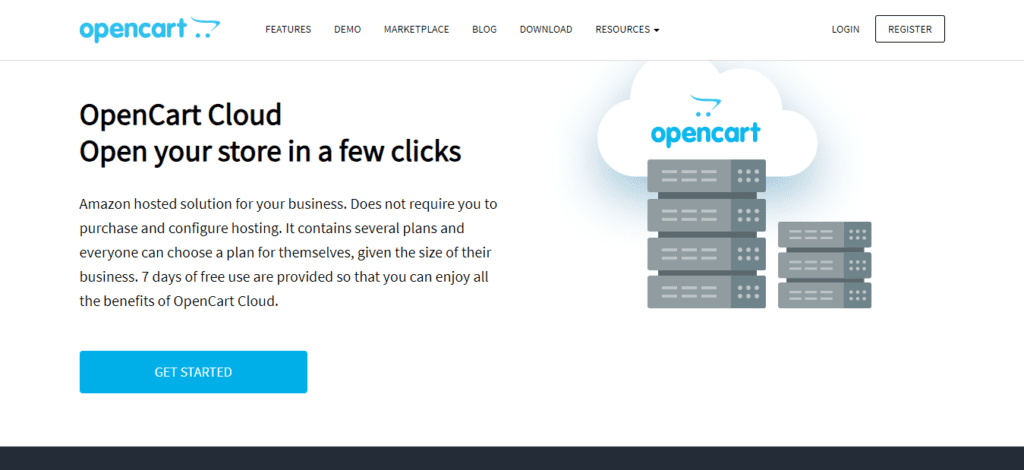
BigCommerce
BigCommerce is a popular choice among Shopify alternatives. It provides businesses with extensive sales features, making it suitable for larger businesses or those with growth ambitions.
Features
- It offers a range of SEO features, including editable URLs and automatic sitemap generation.
- BigCommerce supports multi-channel selling, allowing businesses to sell on marketplaces like Amazon and social media platforms like Facebook.
Pros
- It provides unlimited product options, which gives businesses the freedom to sell as many different products as they want.
- BigCommerce doesn’t charge transaction fees.
Cons
- The platform can become costly for high-volume stores due to its tiered pricing structure.
- It could be somewhat complicated for beginners due to its sophisticated features.
Pricing
BigCommerce offers several pricing plans, starting from $39/month for the Standard plan to $399.95/month for the Pro plan. There is also an Enterprise plan with custom pricing.

Pinnacle Cart
Pinnacle Cart, another excellent Shopify alternative, is designed to provide businesses with everything they need to succeed online.
Features
- Allows for full customization of your store.
- Offers a wide variety of payment gateways.
Pros
- Offers excellent marketing and SEO tools.
- Provides a wide range of integrations.
Cons
- It lacks a built-in blogging feature.
- It doesn’t offer a free plan.
Pricing
Pricing for Pinnacle Cart starts from $79.95/month.
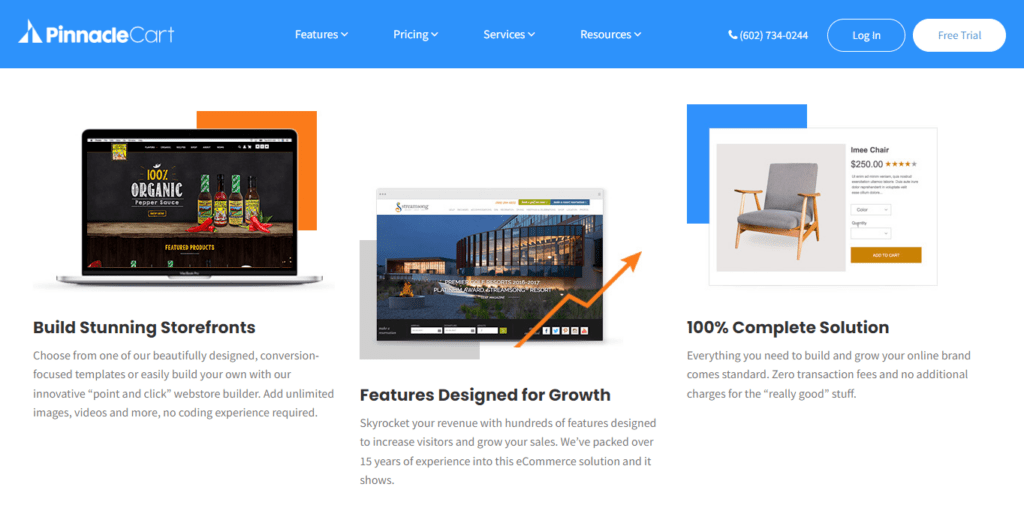
Squarespace
Squarespace is known for its stunning, high-quality templates and ease of use, making it an appealing Shopify alternative.
Features
- Squarespace offers strong inventory management, allowing businesses to manage their products effectively.
- It has built-in SEO tools, a blogging platform, and supports multi-channel selling.
Pros
- Squarespace websites are known for their high-quality, visually appealing designs.
- It offers unlimited product listings, even on the lowest plan.
Cons
- It lacks advanced eCommerce features like Amazon integration.
- Squarespace doesn’t support dropshipping natively.
Pricing
Squarespace’s pricing plans start from $16/month for personal websites and go up to $65/month for advanced eCommerce stores

BigCartel
BigCartel is a Shopify alternative that mainly focuses on creators and artists.
Features
- It offers simple tools to set up and run an online store.
- Provides options to customize your store’s look and feel.
Pros
- It’s an excellent option for artists and individuals selling handmade products.
- BigCartel offers a free plan that allows selling up to five products.
Cons
- BigCartel’s feature set is quite limited compared to other Shopify alternatives.
- It lacks advanced eCommerce features like abandoned cart recovery.
Pricing
BigCartel’s pricing plans start with a free option, while its paid plans range from $9.99/month to $19.99/month.

Shift4Shop
Shift4Shop, formerly 3Dcart, is a fully-featured eCommerce platform and an efficient Shopify alternative.
Features
- Shift4Shop offers a comprehensive set of eCommerce features, including advanced shipping solutions, inventory control, and CRM.
- It provides support for a broad range of payment gateways.
Pros
- It offers more than 200 built-in features.
- The platform is scalable, meaning it can support your business as it grows.
Cons
- The user interface can be complicated for beginners.
- Design capabilities are somewhat limited compared to competitors.
Pricing
Shift4Shop’s pricing starts from $29/month for the Basic plan and goes up to $229/month for the Pro plan.
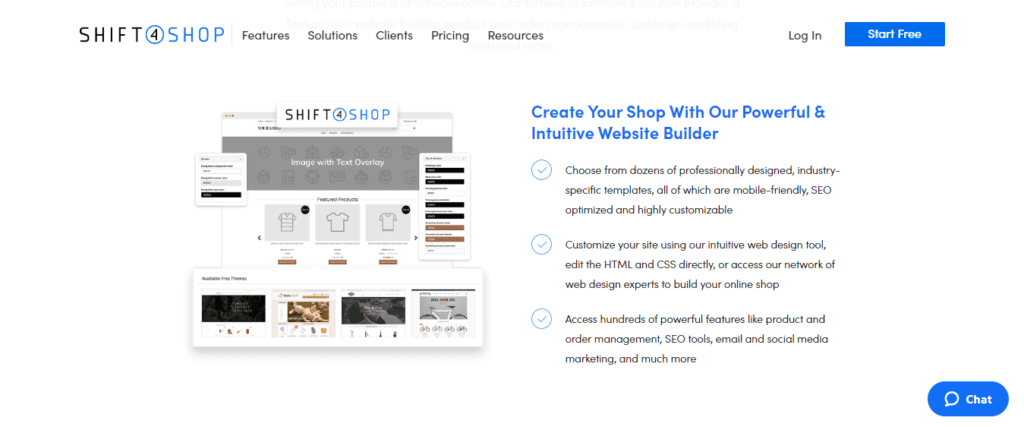
Volusion
Volusion is an all-in-one eCommerce solution and a noteworthy Shopify alternative.
Features
- It provides a variety of features including inventory management, customer management, and payment gateway integrations.
- Volusion supports social media selling.
Pros
- It offers excellent analytics and reporting tools.
- Volusion provides phone support on all plans.
Cons
- It does not offer a blogging platform.
- The platform imposes bandwidth limits.
Pricing
Volusion’s pricing plans start from $35/month for Personal, $79/month for Professional, and $299/month for Business. There’s also a custom-priced Prime plan.

X-Cart
X-Cart is a robust eCommerce platform and a solid Shopify alternative for businesses with some tech expertise.
Features
- X-Cart offers unlimited product listings and a multitude of payment gateway options.
- It supports multiple languages and currencies.
Pros
- It provides powerful features for larger businesses.
- X-Cart offers strong SEO tools.
Cons
- It requires some level of technical expertise to set up and maintain.
- X-Cart’s customer support can be expensive.
Pricing
X-Cart’s pricing starts from $199/month.
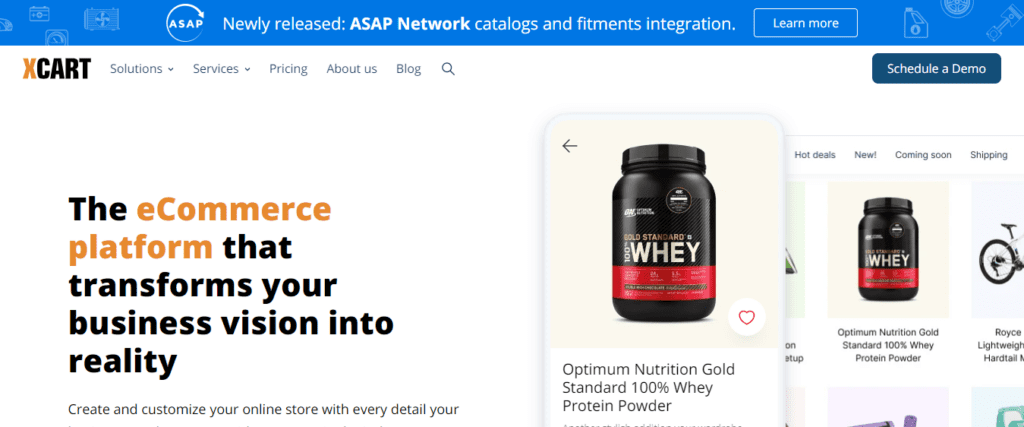
Square Online Store
Square Online Store is an ecommerce platform designed to help businesses create an online store, sell online, manage inventory, ship products, and market their business. It is often compared with other ecommerce platforms like Shopify, and hence is often considered as one of the Shopify alternatives.
Features
- Ease of Use: Square Online is known for its user-friendly interface. It’s easy to set up and start selling with Square Online.
- Pricing Plans: Square Online has flexible pricing plans. It offers a free plan where you only pay when you make a sale at a rate of 2.9% + 30 cents per transaction.
- Product Listing: Square Online allows unlimited product listings, offering businesses the freedom to showcase a wide variety of products.
- Inventory Management: It automatically syncs your online and in-store orders, items, and inventory, reducing the risk of overselling.
- Sales Channel Integration: Square Online lets you manage various sales channels, including online sales, and orders from all stores and locations. It also allows selling on social media platforms like Instagram and Facebook.
Pros
- Easy to set up and use, making it suitable for businesses that are new to ecommerce.
- It offers a free plan which can be a good starting point for small businesses.
- Ability to list various types of products without any limitation.
- Seamless integration with Square POS system to sell online and in-person.
Cons
- While it’s easy to use, its design features may not be as robust or customizable as other Shopify alternatives.
- It might not be suitable for high-volume e-commerce sellers due to its lack of advanced shipping and inventory management features.
Pricing
The plus plan starts from $29/month.
Square Online store stands out for its ease of use and budget-friendly pricing plans. Its features such as easy setup, affordable pricing, unlimited product listing, inventory management, and sales channel integration make it an appealing option for businesses of different sizes.
In a nutshell, the selection of Shopify alternatives and ecommerce platforms ultimately depends on your specific business needs and resources.
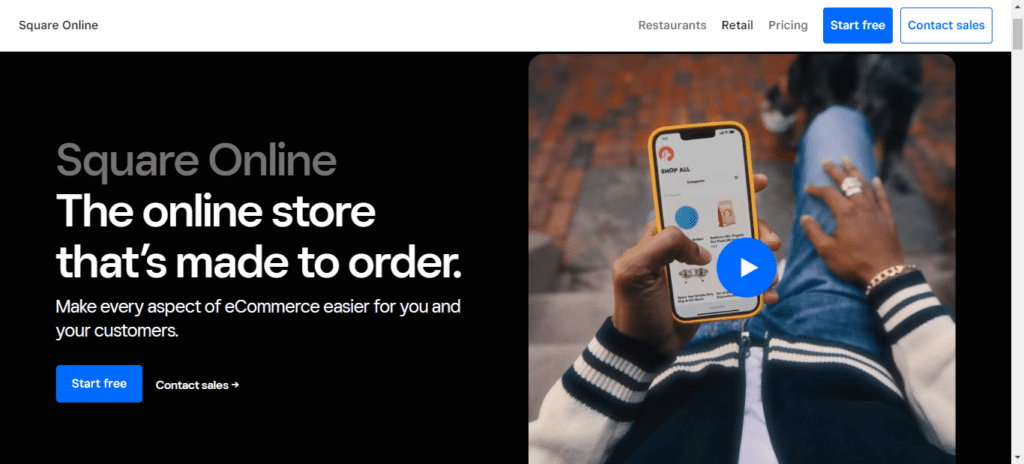
Conclusions: The Best Alternatives to Shopify in 2023
Shopify has grown to be one of the leading platforms for ecommerce businesses, providing a one-stop solution to establish and manage online stores. However, there are valid reasons why some businesses may look for Shopify alternatives, including different pricing structures, additional features, or compatibility with other systems.
WooCommerce stands out among the finest Shopify alternatives in 2023 for those seeking full customization and scalability. With WooCommerce, online businesses can expect to enjoy freedom of migration and a great content management system (CMS) due to its integration with WordPress.
Another notable alternative is BigCommerce, which offers robust features for product categorization, inventory stock updates, and is a competitive choice for businesses seeking built-in inventory management systems.
Adobe Commerce emerges as a preferred choice for advanced customization and is especially suited for large businesses or those requiring more sophisticated online store functionalities.
For small businesses or those seeking ticketed online events, Wix is an ideal choice among the Shopify alternatives. Wix offers a blend of simplicity and versatility that accommodates various ecommerce needs.
Ecwid, another Shopify alternative, is perfect for businesses seeking an omnichannel ecommerce platform. It integrates well with various platforms like WordPress and is a preferred choice for those who want more control over hosting their online stores.
In conclusion, the perfect Shopify alternatives for 2023 span across WooCommerce, BigCommerce, Adobe Commerce, Wix, and Ecwid. Each of these alternatives offers unique strengths, catering to different needs, and businesses should make their choice based on their specific requirements. Remember, the platform you choose will play a significant role in your ecommerce success.
Frequently Asked Questions
What sites are better than Shopify?
There are several ecommerce platforms that offer unique features and can be considered as alternatives to Shopify. Some of these include WooCommerce, Magento, BigCommerce, PrestaShop, Dukaan, Shift4Shop, Volusion, OpenCart, Squarespace, X-Cart, Square Online Store, Big Cartel, Weebly, PinnacleCart, Ecwid, and Sellfy.
Is there a free Shopify alternative?
While most ecommerce platforms offer free trials, few provide completely free plans. However, some platforms like WooCommerce and Ecwid may be used for free to some extent, but for more advanced features, upgrading to a paid plan would be necessary.
Does Shopify have competitors?
Yes, Shopify has many competitors in the ecommerce platform market, some of the most notable ones being WooCommerce, BigCommerce, Magento, and Squarespace.
Why not choose Shopify?
While Shopify is a robust platform, some reasons not to choose Shopify could include its transaction fees, less flexibility compared to some other platforms, and potentially higher costs. Additionally, some users may find it lacks certain customization options they need.
Why would I need an alternative to Shopify?
You might need an alternative to Shopify if you require more customization options, want to avoid transaction fees, have a small budget, or if you prefer a platform that doesn't limit partner programs. Each business has unique needs and the choice of platform should reflect those requirements.
Are there any free alternatives to Shopify?
Some platforms like WooCommerce and Ecwid provide limited free services, but for more comprehensive ecommerce features, you'd likely need to upgrade to a paid plan eventually.
What can I use instead of Shopify?
There are several alternatives to Shopify you could use, such as WooCommerce, BigCommerce, Magento, and Squarespace, among others. The choice depends on your specific needs and preferences.
Who are Shopify competitors?
Shopify's competitors include WooCommerce, BigCommerce, Magento, and Squarespace among others. Each of these platforms provides unique features and functionalities to meet different ecommerce needs.







